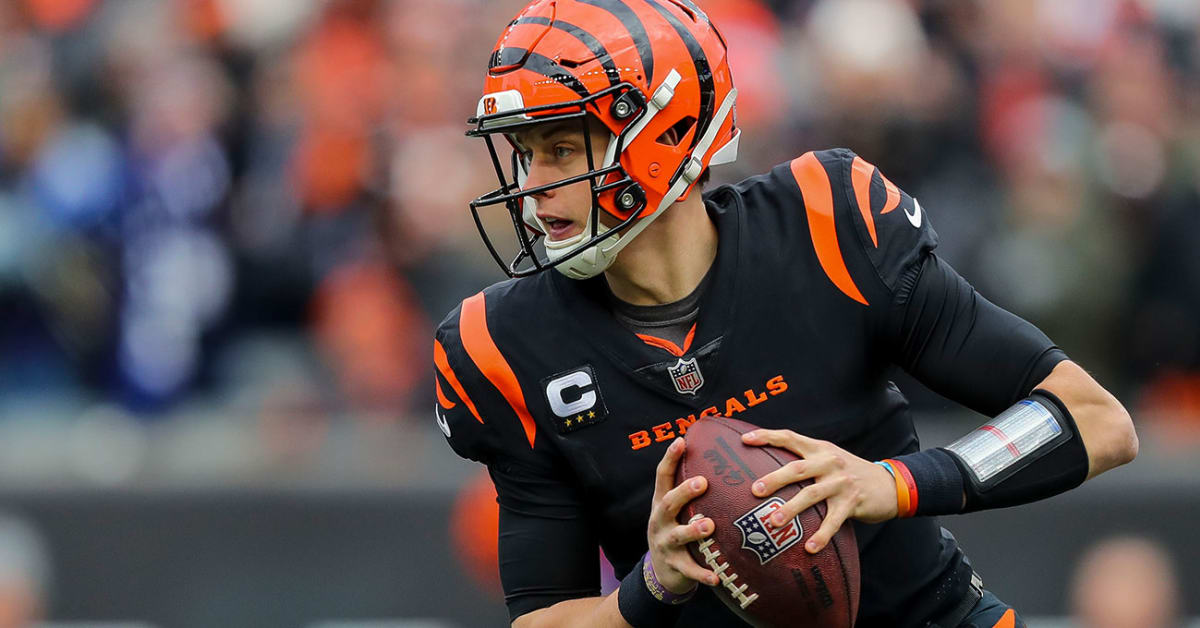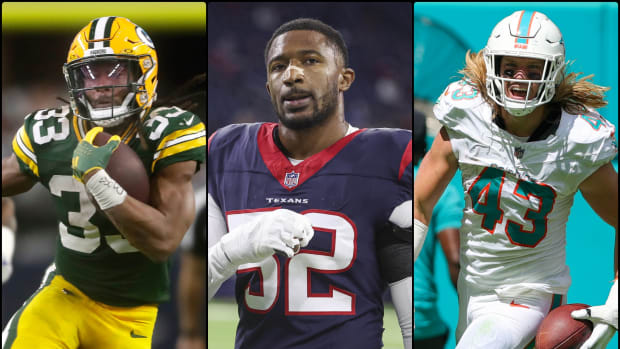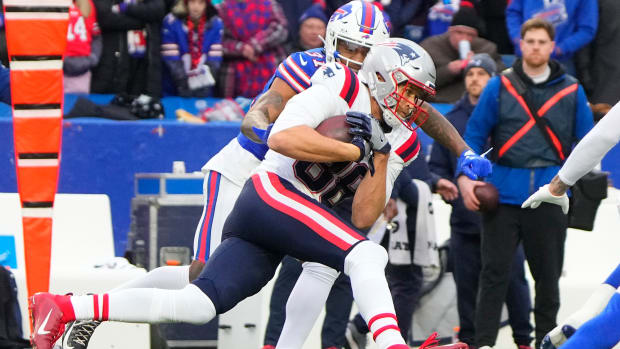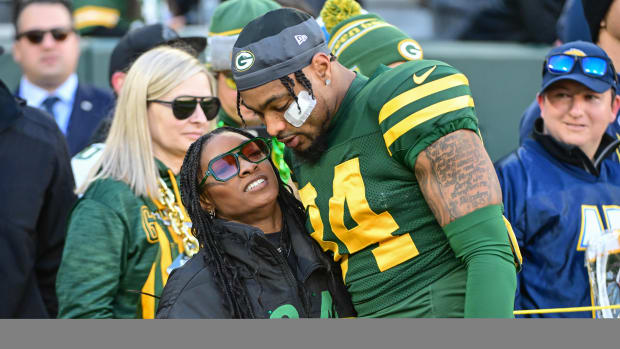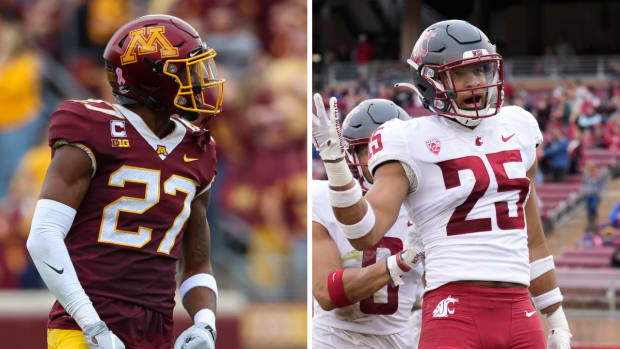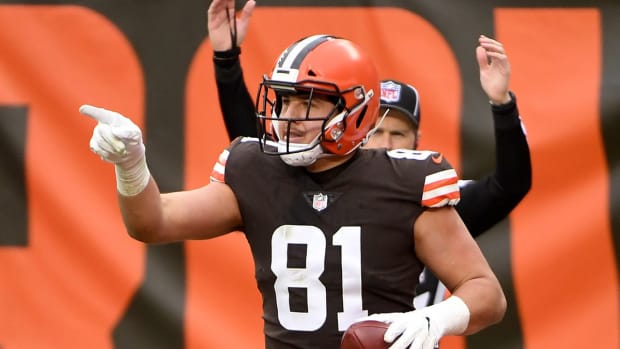A Wave of Young, Star Quarterbacks Could Make the Lamar Jackson Contract Fight Look Silly
I once purchased full-price tickets to see Charlie Sheen on his Tiger Blood tour, which disqualifies me from giving people advice on how they should spend or acquire their money for the rest of eternity.
But that won’t stop me, and all of us, from wondering what might happen to Lamar Jackson in the coming weeks and months as he tries to finesse a fully guaranteed contract out of Ravens owner Steve Bisciotti’s bank account (something I do think will eventually happen, by the way). It also won’t stop me from wondering whether the three impending contract negotiations that are set to absolutely shatter the quarterback financial world—Joe Burrow’s, Justin Herbert’s and, eventually, Trevor Lawrence’s—will mirror Jackson’s, with requests for fully guaranteed dollars that eclipse, in average annual value, the deal Deshaun Watson signed with the Browns last offseason.
Wouldn’t it be great to have a renaissance of the old QB Club days, when those guys wielded more power than an Old Western sheriff’s department? Burrow, Herbert and Lawrence may ultimately have different goals from Jackson’s, but their value to their respective franchises is infinite. Their momentary grip on the wheel is stronger. If any of the Bengals, Chargers or Jaguars lost any of those players due to a contractual standoff over the ability to back out of the deal at some point, ultimately to save a few million dollars, they would be lampooned forever—relegated into the pit of unserious teams content to operate as cute little football outposts never again to be seen in the Super Bowl conversation. For the first time in history, sensible folks would be lining up begging for the thing they love and depend on to be purchased by some hedge fund goon.
There is a delicate way of pointing out Burrow, Herbert and Lawrence are all less of a long-term risk for contract actuaries than Jackson. The Ravens star has run the ball at least 110 times per season, while Burrow has 152 rushing attempts total over three seasons, Lawrence has 135 over two seasons, and Herbert has 172 over three seasons. Because of the way each of them individually approaches the game, there are fewer moments when the person signing the check has to grimace and wonder whether the investment he made will result in some bottom-line success. That’s a fact. Burrow has a Super Bowl appearance. Lawrence already has as many postseason victories (one) as Jackson. (Here’s where we’ll note that the other star QB eligible to sign his first top-of-the-market deal this offseason, Jalen Hurts, runs as often as Jackson, with or without his linemen shoving him into a scrum by his backside.)

Burrow is better positioned to get the contract Lamar Jackson is seeking—if that’s what he wants.
Katie Stratman/USA TODAY Sports
For all I know, Burrow, Lawrence and Herbert may get off on the idea of signing a long-term deal that is far less grandiose than the leaked numbers suggest. They may love the idea of hearing Jim Nantz and Tony Romo talking on CBS about how they took less money so their teams could build a team around them (the ultimate football lie). They may not want to take the hit to their own developing legacies, fearing that asking for their true worth would somehow muddy their relationship with Season-Ticket Holder Phil, who tweets “thumbs down” memes to every player who costs him a buck in daily fantasy. You know, the ones we’re really out to impress.
If not, they should definitely ask for what Watson got and more, because their teams are going to have almost no choice but to fork it over. And if that happens, how silly will this Jackson discussion feel in a year or two?
I want to be careful about holding Watson up as some kind of catalyst. He became available at a time of extreme market scarcity and found a team completely and wholly willing to debase itself for his services (when your analytics plan favors the likes of Baker Mayfield, Mitch Trubisky, DeShone Kizer and Robert Griffin III, can you blame them for tweaking the model?). That deal was an outlier.
The next wave, however, could make it the norm. Burrow is in the final year of his rookie contract, and while the Bengals have the fifth-year option available in 2024, it would be complete lunacy for them to get to that point without a long-term pact. The same is true for Herbert, who was part of Burrow’s ’20 draft class. Lawrence has two years remaining on his rookie contract, plus the fifth-year option, but is approaching a level of superstardom that may allow him to ask for a new contract with significant time remaining on his rookie deal.
The next wave could create a fortress from which all elite quarterbacking contracts reside. Imagine a world where Lawrence, Burrow and Herbert were drafted during Jackson’s year and Jackson was taken in 2020. How much easier is it to envision all of them having fully guaranteed pacts in line with Watson’s deal? From that reality, how much harder would it be to fault Jackson for wanting what should be a standard for the best at the position, whose duties are not only that of full-time players but marketers, coaches and personnel executives? In the old system, one massive QB deal prompted the next. Andrew Luck, Derek Carr, Aaron Rodgers, Patrick Mahomes—it didn’t really matter. You leapfrogged the guy before you. You got at least what he got.
Again, we’re not telling Burrow, Herbert and Lawrence what to do. We’re just reminding them how much easier it might be for everyone else if they ever decided to band together. Owners collude. Players, whether they realize it, use that collective strength to normalize whatever is being colluded against.
































